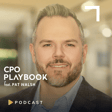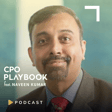Introduction to Workforce Data Challenges
00:00:01
Speaker
I'm Felicia Shakiba, and this is CPO Playbook, where we solve a business challenge in every episode.
00:00:14
Speaker
A significant challenge faced by organizations today is their inability to effectively harness and utilize workforce data for informed business decisions and analytics. Despite the accumulation of substantial data through HR systems and processes,
00:00:31
Speaker
A lack of robust data foundations and architecture prevents its meaningful utilization. Recent research from Sherm.org indicates that 42% of companies do not utilize workforce analytics at all. This represents a considerable missed opportunity, as organizations forgo valuable insights that could enhance various areas such as recruitment, retention, and diversity.
Importance of Data Governance and Foundations
00:00:56
Speaker
The crucial first step forward unlocking the value of workforce data involves establishing sound data governance, structure and quality. Yet many organizations neglect this fundamental groundwork. With me today is Richard Rosenow, VP of People Analytics and Strategy at OneModel. Richard, it's great to have you here today. Thank you, Felicia, for having me on the show.
00:01:20
Speaker
Richard, can you tell me why is getting data foundations and architecture right so important? Oh, I think it's right in the name. It's the foundation of everything we get up to within the people data space. So truly, if you try to build people analytics without having that core foundation stability, the confidence in your data, and it's like build on sand.
00:01:40
Speaker
And so I think really starting with, do I have confidence in my data? Do I understand my data? Do I have the right data before you start asking some of these deeper questions? Because otherwise you'll answer those questions, but you might answer them with bad data or the wrong data, or you may not have the data you need by the time you get to the end of the project.
Common Mistakes and Ethical Considerations in HR Data
00:01:56
Speaker
So truly, I think in the name of foundations is the starting spot.
00:01:59
Speaker
In your experience, what are some common mistakes that organizations make when it comes to building their data foundations? That's a good question. If you've made mistakes, if you've found yourself in the kind of trenches of data projects that are not going the right way, like give yourself some credit, give yourself some space because this is a new space for a lot of HR teams.
00:02:18
Speaker
But really, I think I see a couple of things about HR specifically that teams tend to overlook. Because I think a lot of times IT teams will say, hey, we've got data other places. We do data projects all the time. We can do it for HR. Don't worry. But the reality is HR data is different. And it's different for some technical reasons, as well as just a very big ethical reason, which is this is data about people and their work. And the relationship between people and their work is so important. But if we get that wrong, if we make mistakes here, it doesn't just
00:02:47
Speaker
throw off our forecast a little bit or maybe have some downstream impact to the kind of sales, but it could change something like to get paid differently to get a performance review that's not quite right to have their data misaligned in different ways. It is a really a life-changing thing to mess up data. But I think there's that just that ethical piece right off the bat that this is a human. This is someone who has a livelihood, friends, family, and we've got to treat that with a different level of respect.
00:03:08
Speaker
I think the other side is a lot of times we'll see HR data time is a massive element. And the relationship between things we do at HR and time is under spoken about in the sense that it's like, if you get promoted after you quit, well, that doesn't quite work. You've got to get those sequences right. And you've got to say, okay, when did this person come in? Where did they go? How did they move? How did they transfer? And that sequence of all of those times across all of those systems have to harmonize.
00:03:33
Speaker
That is a massive data problem. And it's one that's really underappreciated by a lot of HR teams and IT teams. And it really comes down to things like back data changes. Hey, that person quit three months ago. We forgot to enter it. Ultimately not that bad, but I've seen it happen and it gets entered in the back. And then you've got to reinstate the data warehouse. You've got to go back and redo things, redo things. And there's some real landmines there.
Regulations and Maintenance of Data Systems
00:03:54
Speaker
I think the other one that really comes to mind is around the regulatory.
00:03:58
Speaker
So HR data, again, being people data is highly regulated, especially in the EU, but also across New York, California, other places around the world, where if they data set that really has protections in place, which are good, healthy protections, these are good things to be aware of and be thinking about. But if it's an IT theme that maybe isn't as first in that, they might not have the legal background. When they start to approach those things, they can get a little bit over their heads.
00:04:20
Speaker
Maybe the last one we'll bring up is around the maintenance. Everybody likes to build a data foundation. Everybody wants to do it. The fun project to build from scratch. Let's do it. Let's build all these systems together. But then suddenly it's built and then you change your HRIS and then you want to change your ETS and then you want to change your performance system. And oh my goodness, we have to redo everything again and nobody wants to go back. So I think about maintenance as one man. A lot of teams tend to overlook in those early stages.
00:04:43
Speaker
Wow. And like you, I've seen other companies, they'd had a restructure and still don't know what their headcount is because they forgot to take people out of the system. And so your data is so dirty. And that type of timeline of making sure and validating that data could take nine months to a year to actually figure out. So I understand how those mistakes could have tremendous impact on an organization.
00:05:12
Speaker
Yeah. And I think a lot of HR leaders, as they approach data, it's really the first time they've gone into that because a lot of times HR professionals, we come up through the ranks of three different ways. You get to the top of the HR organization. You're then faced with this challenge around how do I handle my data? How do I support my data in these different ways? And without that experience, looking across a lot of companies,
Building Effective Data Architecture
00:05:30
Speaker
you can feel like you're making a lot of mistakes. But the reality is like this space is hard. This is difficult to dig in here. And as an HR leader, I think sometimes we doubt ourselves in that.
00:05:39
Speaker
to anyone listening just to give them a little bit of confidence. You're like, you're not alone. Everybody's struggling with this. HR data is one of the most complex data sets across the business. Just hand down from someone who's been deep in this field for a long time and have some confidence that this is hard. I completely agree. And I think that is warranted. You give people the confidence to say, Hey, it's okay to
00:05:58
Speaker
mess up, we're all messing up together. If you don't move forward and make progress and fail, you're never going to get to the other side of this story. And data foundations is really the only thing that we're really focused on in this episode. And I could only imagine the amount of conversations that will come from this episode. But with that being said, the importance of the foundation is so critical. That is a rippling effect on everything else that we do. So that's why it's so important to get it right.
00:06:26
Speaker
But when we think about starting to build a solid foundation, what are those key components of an effective data architecture?
00:06:36
Speaker
It's a good question. And I'm going to take this a little bit away from a technical side, a little bit more to some of the outcomes you should be looking for. One of the things I think about when somebody has a really strong data foundation within the workforce is confidence. You should be walking away confident that you know what reality is. And that's a funny way to say it, but a lot of teams, it's a little bit unclear, like what is our headcount? As we said earlier in the, and that just random teams, that's fortune 50 companies that are struggling with some of these kind of just.
00:06:59
Speaker
What is the reality of our company today from a headcount, attrition, diversity, talent, you name it there. I think about you should have confidence when you go into those conversations with finance leaders, with business partners to say, hey, I know my stuff is clear, clean, architected appropriately, and I can speak to what's happening on the ground. That immediately removes so many domains.
00:07:19
Speaker
Because when you get into the room and you say, hey, it's x, y, z number, and then finance says, hey, it's actually ABC. And suddenly you're in this back and forth with this team and that small piece of data, you know, it's only off by three or four. And actually now like headcount of tens of thousands is off by three or four and suddenly the questions. And it's this barrage of questions that just takes you away from the real goal of the meeting.
00:07:38
Speaker
But the goal of the meeting is to drive the business forward. It's to drive business outcomes and use data to get there. But when your data is questionable, suddenly that just starts to crumble. But I think, again, coming back to that core word of foundation, like having that confidence to come into a conversation and say, I know my stuff. This is what's happening across the workforce. Let's move forward from there. That's how you know when you have a strong foundation. I think what you brought up was really important, which was headcount.
00:08:03
Speaker
And when you think about headcount, how do organizations get this wrong? Talk to me a little bit more about that. This is a funny one. And it's one that I've used this question in interviews when I'm talking to people in political leaders, which is like, Hey, could you give me six calculations for headcount? And it's one of those, like you could start to see the wheels start turning because there's not one way to do headcount. There's 50, 60, hundreds of ways to do headcount.
00:08:24
Speaker
You could do 30 day rolling averages. You could do start a period, end a period on an average. You could do point in time at a given day. Do you count the people who quit that day in that headcount number? It's one of these places I tend to refer to this as a quantum HR. So we talk about data as the atomic level. Like you kind of zoom out from like programs and processes all the way down to the data of HR, but then suddenly you get to that atomic level and you go further and you zoom into this like quantum world that's a little much bigger than it should be.
00:08:51
Speaker
But the reality is these metrics and these measures, there's so many blogs and people out there that are saying, here's the 10 things you should do. This is what you need. And it simplifies it to a point that is oversimplified because every company is so different. And we see that in one model, looking across all the different customers we work with, we define headcount uniquely to each customer the way they need. And headcount is such a basic metric that has so many profound effects on all the other metrics and measures you start to measure.
00:09:16
Speaker
But some companies needed a very specific way for very specific reports. And if you need that, you need to define it that way, you go after it there. And you've got to have that in your report in that specific way. And I hear exactly what you're saying, because in global organizations, you're talking about headcount under a function.
00:09:34
Speaker
headcount in a location, headcount in a country, headcount of full-time employees within a function, within a location. There's so many different ways to parse it. Yeah, so I hear what you're saying, especially in those larger organizations, the amount of different outputs that one could really look at and choose to look at for decision-making. So it is a very big deal in some of these larger organizations.
Improving HR Data Despite Challenges
00:10:02
Speaker
I'll say though, architecture reduces that conversation. So the purpose of having nice architecture in place and having a data foundation in place and saying, Hey, across this globalization, we have 50 different ways to define headcount today. That's got to be one, or maybe it's two and there's a very specific use case for that second one, but it's got to be less. And suddenly all of that noise that takes up so much time, energy and space to validate and correct and change reports and dig in on questions evaporates and you've got more time to spend on the strategy.
00:10:30
Speaker
And I think that's one of the real powers of getting a strong data foundation and having that data governance in place is just reducing the amount of noise you spend validating. So Richard, how do we get started? What steps should an organization take to improve their data? Oh, there's so many. I hate saying it, but it's one of those like consulting kind of things, like it depends, but there's a little bit of it depends here. I think getting access to your data is step one. So as an HR organization, I've seen a lot of organizations that struggle with either tech systems that won't relinquish their data.
00:11:00
Speaker
Or maybe they don't have a tech system in place. Or maybe they're keeping track of things in spreadsheets here and Google sheets there and the data might be everywhere. I think step one, it's a little bit of maybe a page out of Marie Kondo, like you've got to get it all out. You've got to get it all out of the closets, get it all into the bed and then work through it from there. And to be able to kind of parse through and understand what do I have? Where is it happening?
00:11:20
Speaker
and what reports are going out. I think it's that inventory moment. And then reducing. A lot of times, once you start the inventory, you can say, okay, we've got a lot of extra work happening in a lot of places. We've got a lot of people touching this in these little ghost factories of data. Let's get that down to one organization. There's places where decentralization makes sense, but I think that centralization first to understand your data, govern your data, work with your data, and then relinquishing that back out, there's a time and a place for that. But I think step one is just understand what you have and get access to it.
00:11:50
Speaker
Which, unfortunately, because of the variety of HR tech tools we have in technologies that are given, I think it's like 40 or 50 technologies some companies have. I was reading Stacey Harris's HR tech report. Just a tremendous amount of organizational diversity within the HR function. Our data sets in so many places and that's different than other functions. But I think the ability to get it all out, get it organized, get centralized, and then see what you have.
00:12:12
Speaker
So centralize and then create an inventory check and then create a governance, perhaps, of who can access this data and who has access to this data. Just those simple steps could probably take months.
00:12:29
Speaker
It's an incredible one. And even just hearing them back, I'm like, that's such like a highbrow advice to give people because we all know that's not the way things actually work, which is the reality is you've got to go to the plane while you're flying it. You have to still deliver. You have to still be doing, doing these reports live. You're also doing this kind of piece. It is that sort of juggling, but the, one of the things we talked about when I was on people that Linux teams was the tower of inefficiency is sometimes you have to do things badly.
00:12:53
Speaker
And sometimes you do them badly for a little while and then you approve incrementally over time. And as much as it would be really beautiful to kind of wipe things clean, start fresh, get going. Most of the time in HR, we have to just make do with what we have and keep trudging forward. So a little bit of this is like, take the steps where you can, where you have them and move onward. I think maybe another easy step that comes to mind though, is a lot of times we think of HR operations teams as very different than data or people analytics teams. But HR operations is really where data starts.
00:13:23
Speaker
A lot of times that's where data entry happens, that's where processes are defined, that's where the data actually flows from the organization into your tech systems. And so that's actually one of the earliest spots to start when you're trying to think about how do I get good data out of my systems? You've got to think about how that data comes into place too.
00:13:38
Speaker
going back to your comment about time and that we have to build the plane while we're ready to fly it. Well, it's going down the cliff, right? Yes. I think people maybe not understand sometimes that while we're collecting and centralizing this data and finding who has access and who has
00:13:58
Speaker
the capability to input and so forth, those data changes are happening daily if not by the hour. And so making sure that the data is valid in
Advocating for Data Foundations in HR
00:14:11
Speaker
real time or at least on a daily or weekly basis is so critical while we're trying to clean the data and gather the data and centralize it like you mentioned. So it's a heavy lift.
00:14:23
Speaker
Yeah, no, up and out there. What comes to mind is there, there's a lot of vendors, I won't name names here, but there's vendors that say wait until you install our software and our software will finally fix your problem with data. So like when you're switching to HRIS or you're switching your ATS, the new one always says we will fix it.
00:14:38
Speaker
You can stop worrying about your previous one, detect will fix it. And again, it's that I've seen a lot of teams just wait to do data governance then. They say, hey, when this goes live in two years, then we'll have data governance in place. So we're okay until then. But the reality is it does. It starts with your processes. It starts with what you're doing today. And that incremental change is the only way we make any change happen within a company. And I would say it's never too late to start and it's never too early to start. So get involved when you can.
00:15:04
Speaker
Now, in many cases, the reality is that people operations teams don't have that green light to prioritize organizing their data, because let's face it, it doesn't have short-term value. So how can chief people officers and their teams make the case for prioritizing data foundations?
00:15:24
Speaker
This is really the unfortunate reality. A lot of HR teams find themselves in is the HR team understands the architecture a little bit and the IT team doesn't really care. I'm officially IT team. And God bless your IT team. If they care about people data, if they're involved with you, got a great partner, that's amazing. A lot of them just don't quite understand what we're trying to do within the people team because we're in different functions and that's okay too. But this architecture space sits really between IT and HR and requires expertise and knowledge across those. I've got kind of two answers here. I think one is that the vendor landscape is getting better.
00:15:54
Speaker
And when you have these sort of hidden pockets of pain that if you solve them, no one gives you credit for them, try to answer those. Find someone that can come in and help you with that. Find a consultant, find an organization, find a tech vendor that can support you with that architecture piece. I think the other part of me is getting increasingly to the point where I would like more HR teams to just riot a little bit. I think we're at a point in 2023 that you should not be managing any part of your business without being.
00:16:22
Speaker
It is a shameful thing that HR leaders have to go beg, borrow, steal. When the reality is most of the cost of the business sits within our workforce. We know that our business is made or broken by our people. And the HR leader is asking for clean data. I think that's a terrible spot to be. And so I think part of me is like, Hey, we can accommodate, we can figure out ways to get around it. We can give these tricky kind of methods to speak to your peers. But at the end of the day, it's like, we've got to start getting loud.
00:16:49
Speaker
And I think we can get a little bit angry at this point because everybody else has this. Exactly. I mean, I know that from speaking with vendors, they realize that HR is the least tooled function in the business. And I think there is this stigma, this lack of respect for HR teams because a lot of the data that we gather is qualitative. It sits in our mind. It sits in conversations from the day to day.
00:17:13
Speaker
And we don't really have any quantitative evidence to share oftentimes, but I think it is that new year of 2024 that we should be saying we need to prioritize clean data in order to have data, in order to show
00:17:29
Speaker
improve results, that we are valuable as a function. And not just that, but valuable to the business in order to figure out how to make great decisions. In your experience, I'm curious, what are some examples of how organizations have successfully unlocked new discoveries by
00:17:47
Speaker
improving their data foundations and how did that impact the business? It's a little tricky that data foundation sits early in the value process because you've got to get your data foundation in place, then you've got to do some analysis, then you've got to tell some stories, and then you've got to make decisions happen. And so by the time the decision happens, the credit kind of sits usually one step before the decision usually. And we very rarely see the credit go all the way back to this work that happens at this data foundation piece.
Impact of Strong Data Foundations
00:18:12
Speaker
If one of those areas in business, they talk about these as like hygiene areas where it like, if you have good hygiene, nobody really notices. If you have bad hygiene, people call it out. Data foundation's a little bit like that. If it's bad, people notice. But as soon as it gets good, it turns invisible, which is a little tricky.
00:18:27
Speaker
I would say most of the greatest people in analytics teams are built on top of phenomenal data organizations. I saw just tremendous work when I was at Facebook, teams that were doing some just world-class work with diversity and promotions and transfers, just trying to understand how we made sense of a thousand person recruiting organization sourcing talent and sale. That all happened because Facebook had invested in a hundred plus percent data engineering team. It was an incredible resource, like truly separate from the people analytics team, but an incredible resource led by
00:18:57
Speaker
just brilliant people working day in, day out to build the world's best data repositories. We see things like that. Oh, I've been jealous ever since it's the phenomenal organization over there. And they were able to get to incredible heights because they had this foundation they stood on. And I think it's tough when we hear these stories at a lot of conferences of views.
00:19:15
Speaker
Brilliant case studies that people do, you hear about that final moment where it's like, and we changed the CEO's mind, but you don't hear about a lot of this kind of like, it took us a year to get organized on the backend. There's a lot of hidden heroes in the workspace that are doing this enterprise data architecture or HR data architecture. Makes sense. Building a foundation is critical, as you've already mentioned clearly. What does the maintenance look like for ensuring the ongoing governance of their now clean data?
00:19:45
Speaker
Yeah, maintenance is a great tricky question. I think like we were saying earlier, people love to build this stuff, but then suddenly you've got to hand off a workday pipeline. And there is not a single data engineer that went to school saying, someday I'm going to grow up and I'm going to maintain a workday pipeline. That's going to be my job. But workday changes their pipeline. They change their API as they change their datasets. So you maybe configure a new thing within workday. It is a living thing.
00:20:08
Speaker
And I think if what makes HR data a little bit different than other IT projects or tech projects out there is you can't do it once. The HR data is a living, breathing tech amalgamation of all these different technologies we have across HR. And so as we start to bring in more data sets, as we bring in the next one, the next one, the next one, they start to interplay and interact in different ways too. And the scale starts to hit in different ways. So I think maintenance is a nonstop job.
00:20:31
Speaker
And it's why a lot of people end up looking to vendors like one model they're out there that say, Hey, we want to build this, but we might not be on to maintain this indefinitely. That's not our core part of our business and be able to outsource that to consulting teams and vendors is the right move for those companies. It's when we hear from a lot of teams that are fed up with maintenance, that we're getting the maintenance they expected that we're able to get the new data sets they were looking for.
Evolving Role of HR in Data Management
00:20:53
Speaker
Cause it's just so big to try to keep this thing running once you have it.
00:20:58
Speaker
And I think HR business partners have a really key role into the maintenance, right? They are essentially the point person for a specific client group within the business and they're responsible for the input data or when changes get made and so forth. And so I remember organizations that I have worked with have really dedicated an HR business partner to kind of have ownership
00:21:22
Speaker
of a client group's data, like an engineering group's data and so forth. And I think that's a lot of responsibility. The other option is to have the responsibility on the center of excellence, the COE, and having a specific person, one person in charge within the COE that has responsibility over the validity of the data for the entire organization. What have you seen that might work best?
00:21:46
Speaker
I was reflected when you said the HTTP, if businesses didn't change, we would be easy, but we all know there, there is just constant change from each. I was a former HTTP way back line and just like constant change, reorgs, businesses changing business units and things that are happening. The business takes a left turn suddenly. And it's that that keeping an eye on that to understand that I'd be able to translate that back to these data teams. I think that's a tremendous part of this because it doesn't happen in isolation. There's not a data foundation org that sits quietly by itself and just.
00:22:15
Speaker
waters away, kind of their data world. It's really an interplay of the HR system that says, let's keep eyes and ears on what's happening. What do we need? What problems are we trying to solve? Do we have what we need to solve those problems and that interplay back and forth.
00:22:28
Speaker
I think we're going to start with it and where have I seen it work well. I think it's a heavy investment. It's a much heavier investment than people expect. Frankly, I've seen it work well. I've been a customer of one model before I came over here. I hate to keep kind of bringing it that way, but at the end of the day, it's the vendors are going to take this space eventually. I think about this in the sense that you wouldn't build your own payroll system today.
00:22:49
Speaker
That would be a wild thing to try to do. You say, Hey, we're going to build a payroll system. We're going to maintain it ourselves for all these international locations. The payroll vendors have been around really the longest in the intro tech space. They've won that category. You start to see that over the ETFs and HRSs, you wouldn't try to build that in house. Eventually these fringe tech, the vendors come in to kind of take over and say, Hey, we got this because this is an asset and maintaining this by yourself is an undertaking. That's a different strategy than the business you're trying to run.
00:23:13
Speaker
And so we're starting to see the vendor landscape really evolve in that space. We have multiple people in the space of people analytics vendors. We've been here for 10 years. I think they're starting to finally realize that started from scratch and trying to maintain this over time. It's just untenable. Yeah, it is a heavy lift. If you think about how organizations or
00:23:31
Speaker
the function of HR might change in the future is that once they become more analytic heavy, a significant part of their job would be maintaining the data for their client group. That would be a bigger piece of their responsibility as the function takes shape over the next year or two. It's funny. I think we've actually hit the peak of how technical HR will need to be.
00:23:58
Speaker
And this is somewhat related to the kind of vendors in this space, because in chat GPT, a great example, we made a 25 minute thing without saying, I've got to say now chat GPT kind of coming into the picture. But really what we're seeing is we're starting to see the need for SQL go away. That's not data scientists. Data scientists will still be learning SQL, but there was calls from the back of the years, like HR people should be learning SQL. They should be learning kind of code. They should be getting involved with these different technical pieces.
00:24:20
Speaker
And some of it feel true. And if you're passionate about it, go for it. But the reality is like, chat GPT knows SQL better than I do. I will not learn SQL to the point that I had known it in the past ever again in my life because chat GPT handles it for me and can handle it for me with the work I need to do. I think HR 20 years from now will look more like HR 20 years ago, but it does today.
00:24:38
Speaker
The goal is to have the technology start to fade into the background. And really the stuff that only humans can do, that's where HR should be focusing efforts.
Conclusion and Future Discussions
00:24:47
Speaker
Because we're starting to see more and more automations and technologies come up that can take on a lot of evidence-free work, that can take on some of these routine things, even some of these data challenges, and take those off of the HR person's plate. But what computers are not good at is the stuff where HR has always been strong.
00:25:02
Speaker
And that's listening to people, that's working with people, that really like cultural ethnography of the workplace that really only the human mind can do. I would love to see HR move more that direction and let the vendors take over more of the tech spot and let that start to paint. I think going forward, we'll see, it couldn't be an interesting time for HR as we move a little bit back towards our qualitative roots, but I see more of the vendors going to take it on more of that tech step over time.
00:25:25
Speaker
And what advice would you give to chief people officers who might feel overwhelmed or ill-equipped to tackle workforce data and analytics today? I think the first piece of advice is it's okay to feel overwhelmed. There was a Stanford study I saw about the people in analytic space and it was academics that were looking at and trying to understand what we call this place. That was the whole study. And there's like 60 different names for it. It's a truly remarkably complex thing right now because we've seen a new function basically come into existence.
00:25:53
Speaker
as a function in the past kind of 10, 15 years. We've been doing workforce data stuff really since World War II and psychoanalysis. All those good things have been happening for a long time in a lot of places, but as a formal function like recruiting or total rewards or people operations, people in looks is pretty new. And I think the first piece of advice is reach out, talk to people and be comfortable with feeling confused because it's going to be confusing. It's confusing for those of us that are experts.
00:26:18
Speaker
But I will say the people analytics community are none is tremendous. People analytics people can't stop talking about it. They love it. They love talking to other people about it. They love getting people up to speed. It's a group that really there's a sort of a venn diagram of people and data people and people analytics people kind of sit in the middle and they can't get enough of it. And reach out to the community, find someone to talk to, get connected, reach out to me. I'd love to talk to you about people analytics just in general. And if you have any questions about it, please reach out anytime.
00:26:45
Speaker
Thank you so much, Richard. This has been a wonderful chat and we appreciate you being here. Well, it's been a ton of fun. Thank you, Felicia. If today's episode captured your interest, please consider sharing it with a friend or visit cpoplaybook.com to read the episode or learn more about leadership and talent management. We greatly appreciate your rating, review and support as a subscriber. I'm Felicia Shakiba. See you next Wednesday and thanks for listening.




















